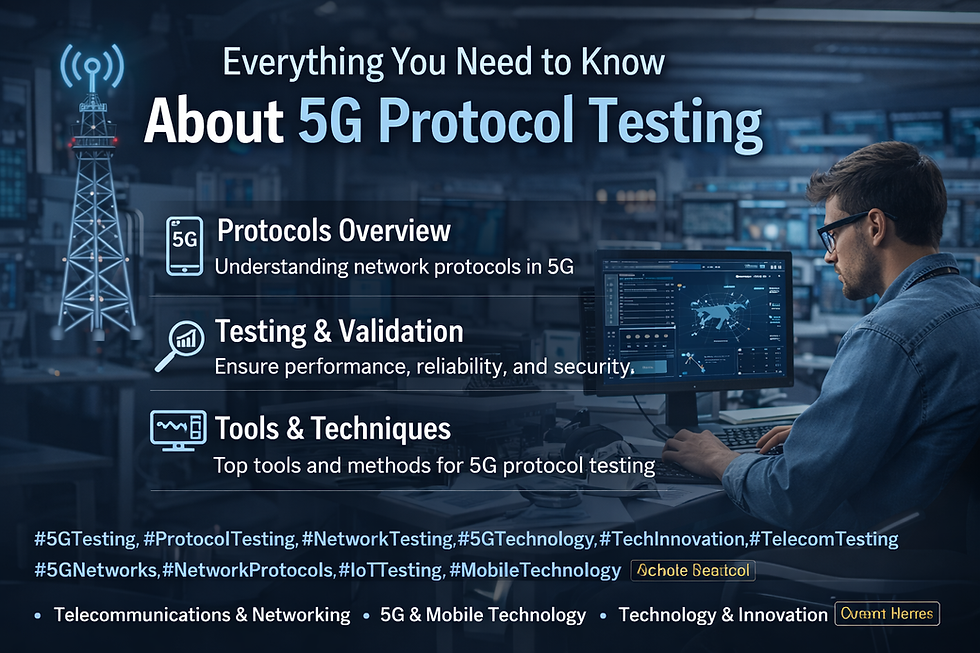The Impact of 5G Telco Cloud on Smart Cities in 2024
- Sameer Krishn
- Jun 24, 2024
- 5 min read
Updated: Jun 28, 2024

Introduction
As urbanization continues to grow, the concept of smart cities has become increasingly relevant. These cities leverage technology to enhance the quality of life for their residents, improve efficiency in public services, and promote sustainability. One of the key enablers of smart cities is the integration of 5G technology with Telco Cloud, which offers high-speed connectivity, low latency, and robust data handling capabilities. In this blog, we will explore the impact of 5G Telco Cloud on smart cities, the benefits it brings, the challenges it faces, and what you need to know in 2024.
Table of Contents
Understanding 5G Telco Cloud
Enhancing Connectivity in Smart Cities
Transforming Public Services
Promoting Sustainability
Boosting Economic Opportunities
Overcoming Challenges
Future Trends and Predictions
Conclusion
Understanding 5G Telco Cloud
Definition and Overview
5G Telco Cloud refers to the convergence of fifth-generation wireless technology (5G) with cloud computing in the telecommunications industry. This combination enables the deployment of high-speed, low-latency networks that support a wide range of applications, from autonomous vehicles to smart infrastructure. The integration of 5G with cloud technology allows for the efficient handling of massive data volumes, real-time processing, and enhanced network reliability.
Importance in Smart Cities
Smart cities rely on a network of connected devices, sensors, and systems that generate and process vast amounts of data. 5G Telco Cloud is essential for managing this data flow efficiently, providing the backbone for various smart city applications. From traffic management to energy distribution, the capabilities of 5G Telco Cloud are instrumental in creating more responsive, adaptive, and efficient urban environments.
Enhancing Connectivity in Smart Cities
Ubiquitous High-Speed Internet
One of the most significant benefits of 5G Telco Cloud is the provision of ubiquitous high-speed internet. This connectivity is crucial for the functioning of smart city applications, enabling real-time data exchange between devices and systems. Residents can enjoy seamless internet access, facilitating communication, entertainment, and access to information.
Smart Infrastructure
5G Telco Cloud supports the development of smart infrastructure, including intelligent transportation systems, smart grids, and connected buildings. These systems rely on real-time data to optimize their operations, improve efficiency, and reduce costs. For example, smart traffic lights can adjust their timings based on traffic flow data, reducing congestion and improving commute times.
Enhanced Public Safety
Enhanced connectivity also plays a vital role in public safety. 5G-enabled surveillance cameras, emergency response systems, and communication networks can operate more effectively, providing timely information to first responders and improving overall security. In case of emergencies, data can be quickly transmitted to relevant authorities, enabling faster and more coordinated responses.
Transforming Public Services
Smart Healthcare
The integration of 5G Telco Cloud in smart cities can revolutionize healthcare services. Telemedicine platforms can provide remote consultations, reducing the need for physical visits and making healthcare more accessible. Real-time monitoring of patients' health data through connected devices enables proactive healthcare management and timely interventions.
Efficient Waste Management
Smart waste management systems, powered by 5G connectivity, can monitor waste levels in bins and optimize collection routes. This not only reduces operational costs but also minimizes the environmental impact by reducing fuel consumption and emissions from waste collection vehicles. Residents can also receive notifications about recycling and waste disposal schedules.
Digital Education
Education systems in smart cities can benefit from digital transformation enabled by 5G Telco Cloud. Virtual classrooms, online learning resources, and remote collaboration tools become more accessible, ensuring that students have access to quality education regardless of their location. Teachers can use real-time data to tailor their teaching methods and improve student outcomes.
Promoting Sustainability
Energy Efficiency
5G Telco Cloud enables the development of smart grids that can manage energy distribution more efficiently. These grids can balance energy supply and demand in real-time, integrate renewable energy sources, and reduce energy wastage. Smart meters and connected appliances allow residents to monitor and optimize their energy consumption.
Environmental Monitoring
Environmental monitoring systems in smart cities can leverage 5G connectivity to collect and analyze data on air quality, water quality, and other environmental factors. This data helps city authorities make informed decisions about pollution control, resource management, and environmental protection. Citizens can also access this information to stay informed about their local environment.
Sustainable Transportation
5G-enabled transportation systems can promote the use of sustainable modes of transport, such as electric vehicles (EVs) and public transit. Real-time data on traffic conditions, public transportation schedules, and EV charging station availability can encourage more efficient and eco-friendly travel choices. Additionally, autonomous vehicles can operate more safely and efficiently with low-latency 5G networks.
Boosting Economic Opportunities
Smart Retail
The retail sector in smart cities can benefit from enhanced connectivity and data analytics. Retailers can use customer data to personalize shopping experiences, optimize inventory management, and improve supply chain efficiency. Augmented reality (AR) and virtual reality (VR) applications can provide immersive shopping experiences, attracting more customers and driving sales.
Innovation and Startups
The availability of advanced technological infrastructure attracts innovation and startups to smart cities. Entrepreneurs can develop and deploy new applications and services that leverage 5G Telco Cloud capabilities. This creates a vibrant ecosystem of innovation, leading to job creation, economic growth, and increased competitiveness.
Remote Work Opportunities
The COVID-19 pandemic has accelerated the shift towards remote work, and 5G Telco Cloud can further support this trend. High-speed internet and reliable connectivity enable employees to work from anywhere, reducing the need for physical office spaces and commuting. This flexibility can improve work-life balance and increase productivity.
Overcoming Challenges
Infrastructure Costs
The deployment of 5G infrastructure requires significant investment in new towers, fiber optics, and other equipment. Public-private partnerships and government incentives can help mitigate these costs and ensure widespread deployment. Long-term planning and strategic investments are essential for building the necessary infrastructure.
Data Security and Privacy
With the increased connectivity and data flow in smart cities, data security and privacy become critical concerns. Robust cybersecurity measures, encryption protocols, and regulatory frameworks are necessary to protect sensitive information. Public awareness and education about data privacy can also help build trust in smart city initiatives.
Technological Integration
Integrating diverse technologies and systems into a cohesive smart city ecosystem can be challenging. Interoperability standards, open data platforms, and collaboration between different stakeholders are crucial for successful integration. Continuous research and development efforts can address compatibility issues and drive technological innovation.
Future Trends and Predictions
Expansion of IoT Ecosystems
The Internet of Things (IoT) will continue to expand, with more devices and systems becoming interconnected. This will lead to new applications and services in smart cities, enhancing their functionality and efficiency. IoT-enabled devices will generate vast amounts of data that can be used for predictive analytics and decision-making.
Edge Computing
Edge computing, which involves processing data closer to the source, will become more prevalent in smart cities. By reducing latency and bandwidth usage, edge computing enables real-time data processing and faster response times. This technology will support critical applications such as autonomous vehicles and smart infrastructure.
Development of 6G Technology
While 5G is still being deployed, research and development efforts are already underway for 6G technology. 6G promises even greater advancements in speed, latency, and connectivity, building on the foundation established by 5G Telco Cloud. Future smart cities will benefit from the enhanced capabilities of 6G networks.
Conclusion
The integration of 5G Telco Cloud is set to revolutionize smart cities by enhancing connectivity, transforming public services, promoting sustainability, and boosting economic opportunities. As we move into 2024 and beyond, the continued evolution of these technologies will unlock new possibilities for urban environments, making them more efficient, sustainable, and livable.
For those looking to stay ahead in this dynamic field, Apeksha Telecom offers comprehensive training programs with 100% placement assistance. Our courses are designed to equip students with the skills and knowledge needed to thrive in the rapidly evolving world of 5G and Telco Cloud.
Internal URLs:
Apeksha Telecom's training programs: https://www.apekshatelecom.com/training
Apeksha Telecom's placement assistance: https://www.apekshatelecom.com/placement-assistance
External URLs:
Telecom Gurukul: https://www.telecomgurukul.com
Reference URLs:
"The Impact of 5G Telco Cloud on Smart Cities" - Apeksha Telecom: https://www.telecomgurukul.com/post/the-impact-of-5g-telco-cloud-on-smart-cities




Comments